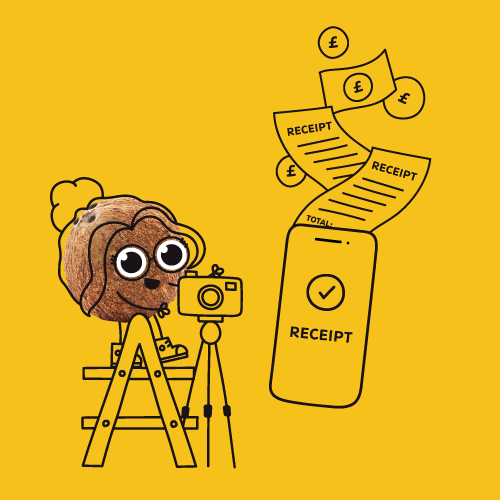The 6th April 2023 marks the first day of the 2023/24 tax year.
The start of a new tax year is a big day in the self-employed calendar: it's usually when any new tax rates and thresholds come into effect, and it's also the first day you can get started on your tax return for the previous tax year. It's also a chance to start afresh—and adopt good habits for the tax year ahead.
With that in mind, we've listed seven key things you can do to ensure that the 2023/24 tax year is smooth sailing for your self-employed business—from day one.
1. Get to know the 2023/24 tax rates
First up, make sure you're up-to-speed with the latest tax rates for self-employed people. Fortunately, many of these have stayed the same as they were in the last tax year; the most notable change is to income tax bands in Scotland:
- Personal Allowance - £12,570 (the same as last year)
- Income Tax (England, Wales, Northern Ireland) - 20% for those earning between £12,571 and £50,270, no change from last year (more detail linked below)
- Income Tax (Scotland) - Income tax bands have changed slightly since the last tax year (see more)
- VAT - the VAT registration threshold (£85,000) and VAT rates (20%) remain the same
Get the full list of tax rates for self-employed people in the 2023/24 tax year.
2. Make a note of the key tax deadlines for the year
The key tax deadlines for the 2022/23 tax year are the same as any other year—but as the deadlines for past tax years often spill into the current one, it can be difficult to understand what's due when. Hopefully this list will make things clearer:
- 6th April 2023: First day of 2023/24 tax year
- 31st July 2023: Second payment on account due for 2021/22 tax year
- 5th October 2023: Deadline to register for Self Assessment (for the first time)
- 31st October 2023: 2022/23 Self Assessment deadline (by paper form)
- 30th December 2023: 2022/23 Self Assessment deadline (for PAYE tax collection)
- 31st January 2024: 2022/23 Self Assessment deadline (online); tax bill payment deadline; first payment on account due for 2023/24 tax year
- 5th April 2024: End of 2023/24 tax year; last opportunity for claim overpaid tax in 2020/21 tax year
Find more information about each of these Self Assessment deadlines.
3. First tax return? Register with HMRC now
If 2022/23 was your first year of being self-employed and you didn’t complete a tax return last year, you'll need to register for Self Assessment and Class 2 National Insurance.
The deadline to register as self-employed is 5th October in the tax year after you started trading. So, for example: if you started working as self-employed on 1st May 2022 you've got until 5th October 2023 to register.
It's best to get this done sooner rather than later, because you'll need to wait for a code to arrive in the post.
When you register, HMRC will:
- Send you a letter with your 10-digit Unique Taxpayer Reference (UTR)
- Set up your account for the Self Assessment online service
4. Start gathering the info for your Self Assessment
A lot of the time and effort involved in doing your Self Assessment tax return is simply gathering all of the information and paperwork you need to fill it in. As such, we'd recommend starting to collect it all earlier rather than later in the tax year—it'll make things so much easier when you’re ready to tackle your tax return. Here's what you'll need:
- Your Unique Taxpayer Reference Number (UTR)
- Your National Insurance number
- Details of your untaxed income from the tax year—including income from self-employment, dividends, and interest on shares
- Records of any expenses relating to self-employment
- Any contributions to charity or pensions which might be eligible for tax relief
- Your P60 or other records showing how much income you received which you’ve already paid tax on
5. Make a start on your tax return
If you’re already registered with HMRC, you can submit your 2022/23 tax return from now onwards. Although you technically have until 31st January 2024 to do this, it’s always good to get ahead of the game and get your tax return out of the way whilst everything is much fresher in your mind—in January 2024, you'll need to cast your mind all the way back to remembering details from April 2022!
Another reason to do your tax return now is that if you find you haven’t saved enough money to cover your tax bill, you’ve still got plenty of time to pull the funds together.
Want to tick this task off your list ASAP? Check out our guide to preparing your Self Assessment tax return in half the time.
6. Seek help if you're unsure of anything
Finally, if you do have any questions about your self-employed finances—whether that's the new tax rates, registering as self-employed, doing your tax return, or anything in between—then we strongly encourage you to seek guidance from a professional. When it comes to tax and finance, it's always better to ask for help than guess and risk getting things wrong.
You can find the answers to many frequently-asked tax questions in our Knowledge Hub; or, if you're already a Coconut customer, you can reach out to our team via the in-app chat—we’re always happy to help.
Alternatively, we recommend you get an accountant. Having an accountant is valuable beyond just compliance and tax planning—it’s about having someone by your side with the experience to help you make the big decisions and build a better business. Coconut also makes it really easy for you to work with your accountant: once you've invited yours through the app, they'll be able to view your business activity and bookkeeping data whenever they need to.










